#theme: subjectivity
Note
hi! would you be able to do a web weave about artists haunting the muse?

U2, The Fly

David Sedaris, Repeat After Me

Charlie Kaufman, Eternal Sunshine of the Spotless Mind: The Shooting Script / Eternal Sunshine of the Spotless Mind (2004) dir. Michel Gondry

Agatha Christie, The Mirror Crack’d From Side to Side

The World Was Wide Enough, from Hamilton; written by Lin-Manuel Miranda

Sanober Khan (via)
#webs#web weaving#theme: the written word#theme: subjectivity#theme: art#mine#requests#u2#david sedaris#(i ended up going down a hole with that one and. i think he is a very good writer but not a very good guy)#lin manuel miranda#charlie kaufman#eternal sunshine of the spotless mind (2004)#agatha christie#sanober khan
185 notes
·
View notes
Text

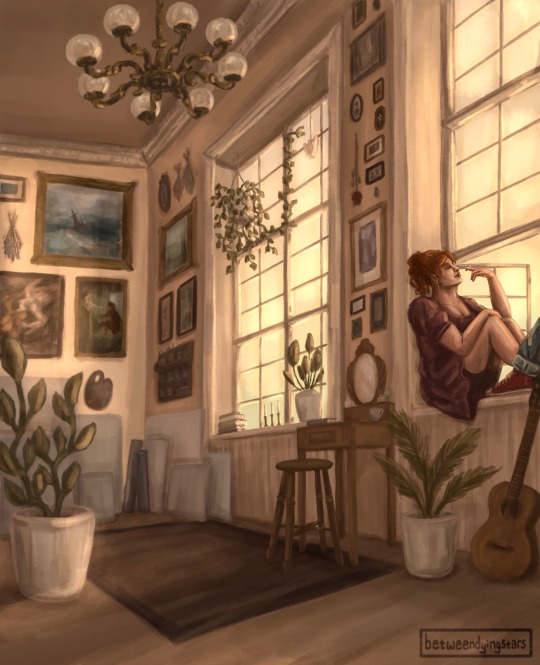
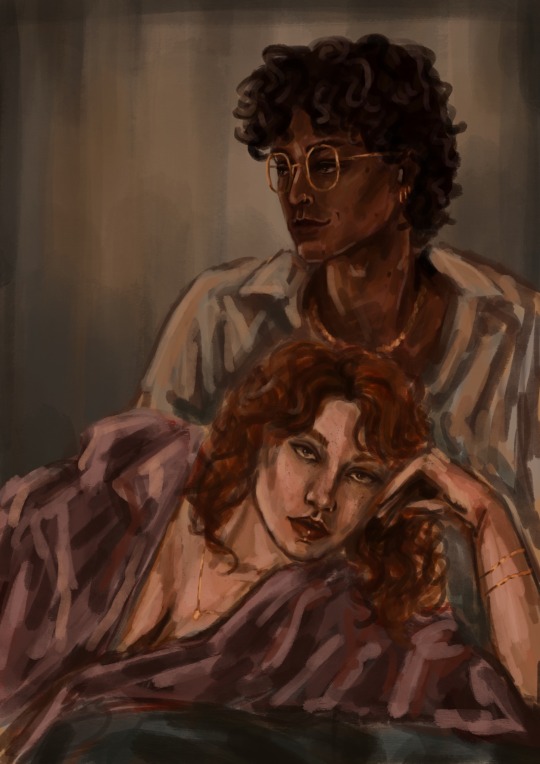
Artist Regulus painting his lovers
This is a DTIYS I’m hosting on instagram to celebrate 1k, so if you’d like to join go find me on there!
#the jegulily agenda got to me and I’m not complaining#if you’d like to join in my insta handle is the same as here and I’d love to see what you come up with!!#there is no deadline and the rules are basically just follow the theme#you can change the pose and painting subject etc so just have fun with it!!#marauders#the marauders#regulus black#lily evans#james potter#jegulily#jegulus#regulily#jily#regulus black fanart#james potter fanart#lily evans fanart#jegulily fanart#trans regulus black#artist regulus black#marauders fanart#marauders era#marauders era fanart#fanart#dtiys#betweendyingstars1k#my art
5K notes
·
View notes
Text
ok im waffling on about fallout instead of having breakfast but i saw a criticism of how the prisoners were treated that's stuck with me.
spoilers!
so i think the criticism wasn't incorrect, per se: it condemned the way the show portrayed the vault dweller's naive intention to rehabilitate their murderous captives. it found fault with a common, and horrible, message that tv shows like to say, which is that carcerial violence and even the death penalty is the only effective way to deal with criminals, who are a fundamentally Bad category of human. im sick of that message too! but i think that wasn't what was going on here, actually.
so like, the vault dwellers had only ever experienced violent loss the once, and didn't really know how to cope other than denial and repression of the ordeal. but they were all hopeful and enthusiastic that their prisoners, the invaders that came to kill them all and take their stuff, could be eventually welcomed into the community as their comrades. the champions of this cause were nebbishy dorks and painfully out of touch academics. this is pretty normal for how prison reformers are portrayed, if extremely fucking annoying for those of us who ARE in favor of prison reform.
but so of course when the son of the former overseer, Norm, speaks up and suggests killing the prisoners, because why should they share resources with invaders who explicitly wanted to keep hurting them? why should they show mercy to their attackers? everyone is appalled by this suggestion. because they had to reinvent the whole concept of vengeance right then and there, because grudges and cycles of violence are anathema to a bottle society like theirs. they have been raised all their lives to forgive and forget and now, put to the test, they're recommitting to this ethos: get along, let the past go, look towards the future, believe the best of everyone.
but the prisoners die, anyway. the prisoners are killed with rat poison. and the thing is that Norm who suggested it didn't do it himself. and the prison guard who's blamed for it, even though she privately agreed with Norm that the prisoners are dangerous and unforgiveable, she didn't do it either. it's not a moment of triumphant, cathartic vengeance and it doesn't prove that there's no way to negotiate with terrorists and invaders but kill them like vermin because that's not what the message is meant to be.
the message is that norm stands there in the middle of these inconvenient prisoners, these corpses dressed in his own people's uniforms, and he looks at the new overseer. and he knows that she killed them, and she knows that he knows. she wanted him to know. this is her message and he's reading her loud and clear. and he doesn't look like a guy who's just been backed up by authority, who's just been validated in his desire for the ultimate control over those who have wronged him.
he's scared and pale and the music is ominous as fuck. and he's inside the cell, he's directly in the middle of it.
because what just happened is that he realized his entire society is being held prisoner, and the overseer is the one with the rat poison. and that he doesn't know, anymore, what freedom and safety and justice actually mean, just that he doesn't have them and he doesn't know where to find them.
that's what that scene meant. not that rehabilitative justice is a pathetic delusion of people who have no idea how to make hard choices.
but that before you advocate for killing prisoners, you might want to see how big that prison is, first.
and which side of the bars you're standing on.
#fallout#look i went NUTS over the prison scene#it's gonna live in my brain for a good long while#RATS ARE A BIG THEME IN THIS SHOW#the rats that are vermin and the rats that are lab subject#both disposable#both struggling so hard to survive#both in pain and wondering what's going on and why is life so hard#both disposed of when they go where they shouldn't
666 notes
·
View notes
Text
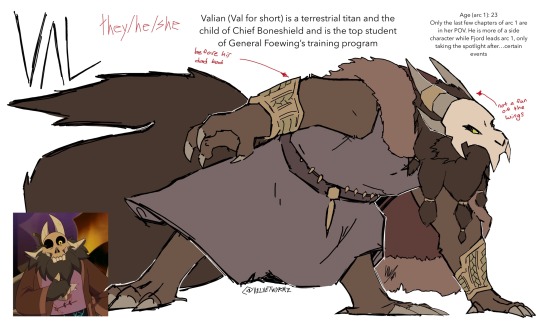
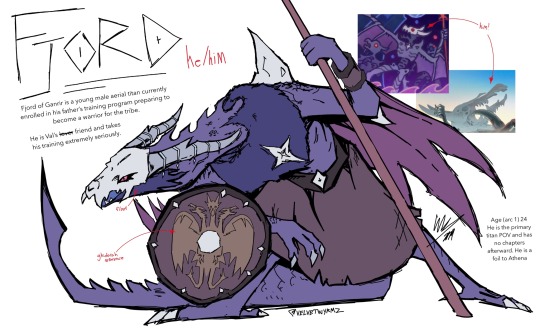

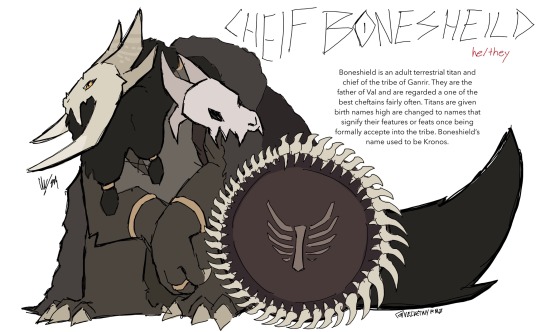
SAI major titan characters for arc 1! Valian, fjord, foewing, and Boneshield. I spelled shield wrong. My bad. Don’t tell me I don’t care.
Feel free to send asks about them
#the owl house#toh#stardust and ivory#my art#toh au#toh art#toh fanart#the owl house fanart#titan toh#papa titan#designs subject to change#I want to make foewing as satanic as possible#he’s already got an upside down cross on his chest#sai has lots of religious themes
494 notes
·
View notes
Text
honestly not sure why people are so into elves tbh, they're kind of mid
#cute ears and all#and sometimes interesting subjects of immortality themes#but like#not really anything beyond that#rambles from the moonsink
456 notes
·
View notes
Text
*deep breath in*
the fears 👏 have always 👏 been (in one way or another) 👏 parallel 👏 to 👏 desire 👏
let me explain.
so many of the statements given by actual avatars center around some sort of need that was met by their entity. Lots of them even had a positive relationship with the fear that drove them.
Jane Prentiss is an excellent example - the Corruption has always been about a form of toxic and possessive love, but she personally has a deep desire to be “fully consumed by what loves her,” and finds a perverse joy and relief at allowing herself to be a home
Jude Perry is another - she fucking loved watching people’s lives be utterly destroyed. The Desolation only offered her a power of destruction on a grander scale, and then gave her a more intense rush of joy as she did its work. When she tells Jon that he needs to feed the Eye before it feeds on him, it’s almost as an afterthought; she was happily feeding the Desolation long before it burned her into a new existence.
Simon Fairchild. Every time that old loose bag of bones wanders into the picture, he is having a fucking EXCELLENT time playing with the Vast. He loves showing people their own insignificance, and he loves luring them into situations where he can throw them into the void as he smiles and waves.
Peter Lukas (hell, the whole Lukas family (except Evan. RIP Evan.)) hated. people. all he wanted was for them all to go away, to leave him alone. The Lonely only fulfilled that desire.
Daisy, Trevor, and Julia, all devoted to hunting those things they deemed monstrous.
Melanie, holding tight to that bullet in her leg because on some level, she wanted it. It felt good, it felt right, it felt like it fit right alongside the anger and spite that drove her to success.
Annabelle Cane first encountered the Web when she was a child, running away from home in order to tug on her parents’ heartstrings in just the right way to have them wrapped around her little finger. Later on she volunteered to be the subject of an ESP study. Hell, she’s the one who dangled the “Is it really You that wants this?” question over Jon’s head in S4.
And that brings us to Jon, beloved Jarchivist, the Voice that Opened the Door. Ever since he was a child targeted by the Web, he was looking for answers. He joined the Magnus Institute’s Research Department looking for them, he stalked his coworkers in search for them, he broke into Gertrude’s flat and laptop out of desperation for them. And when he realized that all he had to do was Ask to get truthful answers to his questions? It was only natural for him to jump at that opportunity.
Elias told S3 Jon that he did want this, that he chose it, that at every crossroads he kept pushing onwards, and the inner turmoil that caused was one of the focal points for Jon’s character through the rest of the podcast.
There’s a certain line of thinking in many circles about the power of the Devil: he’s not able to create anything new. All he’s able to do is twist and warp that which was already present, making it something ugly and profane while still maintaining the facade of something desirable.
Jon didn’t choose the Eye. But he did wander into its realm of power, exhibiting exactly the qualities it was most capable of hijacking and warping to its own ends. Jon didn’t choose the Apocalypse. But Jonah picked at him little by little, pointing him towards each Fear individually. Jon didn’t want to release the Fears. But the Web tugged on his strings just so and laid a pretty trail for him to follow until he reached its desired conclusion.
Jon didn’t choose ultimate power, or omniscience, or even his own role as Head Archivist. But he said “yes” to the right (wrong?) orders and kept on pushing for the right (wrong?) answers. He wanted to succeed at the work he had been assigned. He wanted to protect his friends. He wanted to rescue them when they were lost. He wanted to prevent the apocalypse, to save the world. He wanted to know why he was still alive, when so many had died right in front of him.
The Great Wheel of Evil Color that is the Entities might not fit as neatly into categories in this universe - maybe there was no Robert Smirke trying to impose strict categories on emotional experiences, or maybe the ways they manifest in the world has turned on its head (goodness knows many of them have been showcased and blended in some very fun and new and horrifying ways so far) - but their fundamental foundations seem to be the same. Hell, in episode one we learned that there had been enough individual incidents to create a distinction between “dolls, watching” and “dolls, human skin.”
Smirke’s Fourteen isn’t going to be relevant as common parlance, RQ said that already, but I don’t think that means the Fears themselves (and their Dream Logic-based rules) are different - I think it means that the levels of understanding, language used, and personal connections among people “in the know” are going to be entirely unfamiliar
#tma#tmagp#the magnus protocol#tmagp meta#tmagp analysis#the entities#robert smirke#smirke's fourteen#mind write a meta post that doesn’t turn into a fucking essay challenge#I literally thought about citing my episode sources here but decided that would get too FUCKING long.#anyway I’m pulling mostly from Gerry’s statement (111) and#and the Big Elias Group Confrontation (92)#and Annabelle’s statement (147)#and then finale - 196 / 197 / 200#there are other little lines that I grabbed - tbh feel free to ask about anything I’ve said bc I feel like I’m ready to defend a thesis#I’ve been thinking about this on and off for a few weeks since the desire thing started going around#I have an obsession with Themes as they relate to Worldbuilding and now I have subjected you all to it as well#I am serious tho if anyone wants me to pull the specific parts I’m talking about (whether cuz you have Questions or you wanna ref them too)#lmk#my hyperfocus on silly media brain might as well come in useful somehow#aight peace ✌️
219 notes
·
View notes
Text
i'm not going to lie i hope that the jon sims and alexander j newall text-to-speech voices on the computers that read out the incident reports aren't jon and martin. not because i'm a hater but because i just... don't really want another story about those guys. their story is over. they were both central pov characters in the magnus archives who i got to spend plenty of time with already. and yeah, they'd hardly be protagonists anymore as ghosts in the machine, but considering how much tma fanwork centers around them i'm worried their presence will continue to dominate the fan community. okay maybe i'm a little bit of a hater.
#🐉#tmagp spoilers#like. i LIKE jon and martin as characters but i honestly would prefer their final fate to remain uncertain.#especially considering the themes of audience and subject - watcher and watched - in tma#it feels like it fundamentally goes against that to drag them back into the narrative they sacrificed everything to escape#maybe im wrong and itll be super compellkng and ill eat my words but right now im not thrilled
369 notes
·
View notes
Text
The Dondon Post (or: the bizarre TotK's side content counterpoints to its main quest's immuable binary morality)
Speaking of strange TotK Choices, I think I have one singe post left in me about this game; and it's about the Dondon quest, "The Beast and the Princess".
(and about other stuff too, you'll see, we'll get to them)
More specifically: about how... strange of a thematic point it feebly attemps to make in the larger context of the storyline, and how it seems to be yet another mark of a world that, perhaps, once tried to be more morally complex that it ended up becoming.
Buckle up: it's a long one, and it gets pretty conceptual.
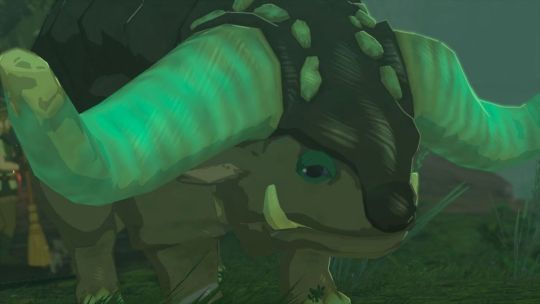
(good gem boys notwhistanding)
The Princess and the Beast
So, a couple of things about the setup. We are investigating potential Princess sightings; but at this point, either because we have already completed a bunch and know the general gib, because we have met a couple of wild Fake Zelda shenanigans, or through the simple fact that we are completing a side quest, we know there's a good chance it won't lead to an actual Zelda information. So when we ask Penn about what is going on and he replies with the ominous "we saw the Princess riding some kind of beast --a frightening one with huge, brutal tusks-- that the princess seemed to control", we get Ideas. Then the sidequest is registered: "The Princess and the Beast".
So. You know me. And if you don't know me, here's what you should know: my brain immediately flared up with the thought there was no way in hell this wasn't some kind of wink towards Ganondorf's renowned boarish beast form, especially given tusks were given so much focus.
My first assumption was: that's a miniboss right? I will get to fight some small boar-like thing that Fake Zelda rides sometimes. Cool! I didn't hold too hard onto my hope that the relationship of Zelda and/or Ganondorf to the natural world, or to each other would be expanded upon, since I had already been burned before, but my interest was piqued.
You have to understand how starved I was for any hint of complexity or mystery or ambiguity at this point. I was extremely eager for the game to throw anything at me that would surprise me, enlighten something pre-established, make the exploration lead to a meaningful discovery or deepening of characters, world or themes (and not just slightly cooler loot, or a bossfight, or a puzzle devoid of emotional context --cohesion and depth is what motivates my play sessions, especially in an open world game that I want to believe is worth losing oneself into). This was about the most intriguing task on my to do list at the moment, and so I plunged in immediately.
After really REALLY misunderstanding what I was supposed to do (I stalked every corner of every forest surrounding the tropical area at night or during blood moons in hope to see something --which was very much the wrong call), I arrived to the other stable, then was guided to the other side of the river where Cima awaits and explains that these creatures are actually a new species discovered by Zelda; that they are gentle and kind and not at all scary ("Dondons aren't beastly, they're adorable!"), and even somehow digest luminous stones into gemstones. They like the company of people and liked Zelda in particular.
I was... I felt two different ways about this conclusion, and I think it's worth to explore both: disappointment and some sort of... "huh!" Hard to describe this emotion otherwise.
I'll get the disappointment out of the way first, because it's the least interesting of the two. While I think the little emotional arc I was taken on was not devoid of interest --I was indeed taken on by the rumor and intrigued by its implications-- I wanted, well. A little bit more. And if the creatures were to be Zelda's pet project, I would have loved for them to be actually terrifying and feisty, and for her to develop an interest for these creatures in particular regardless. It could have been very interesting characterization that veered out of the perfect princess loving the perfect world floundering around her, always bringing her clear, practical benefits from the interaction.
(I have made another post that speaks of my discomfort that Zelda does everything everywhere and everyone loves her for it --I get what they were trying to go for, but it either lacks conflict for me to buy into that dynamic at the scale of several regions, or they went on too hard for my taste, as she is, at once and in the span of a couple of years at most: a schoolteacher, a gardener, an animal researcher, a scholar, a traveler, a military expert, a knower of landscape, a painter, a horse rider, an infrastructure planner, a [...] princess --at some point it begins to sound made up, "Little Father of the people"-esque to rattle the hornet's nest a little bit, especially if it's not shown as either a clearly godly characteristic or, even more necessary imo, a negative trait; another expression of her killing herself at work to compensate for a perceived flaw she's trying to earn forgiveness for, like she did in BotW. But that's another topic, and the clumsiness of her character arc has been well threaded by basically everybody disappointed in the story already.)
But, if I decide to be a little graceful, I'd like to explore my "huh!" emotion, and take it apart a little bit.
I think there's something interesting to have such strong parallels to setting up a story about the relationship between Zelda and Ganondorf ("The Princess and the Beast", like come on guys that's the conflict of over half the series), or at least Zelda and the concept of Evil since Ganondorf pretty much represents it in this game, and then have it go: actually, there was a horrible monster that everyone was afraid of, but Zelda was wise and patient enough to approach it and realize its potential beyond the tusks, what beauty can be brought upon the world if one makes the effort to look for what exists underneath. It says something a bit deeper about the world and about Zelda in particular. It intrigues, at the very least.
Is it a reach? Probably! Is my first interpretation that the quest is actually about "eww you thought Zelda would be interested in *disgusting vile monsters* and not sweet and gentle and human-loving animals that literally shit jewlery when cared for? jokes on you, she never would feel any ounce of sympathy for anything that isn't Good and Deserving" uhhh definitively truer? Probably! But I also don't want to dismiss that the quest made me think about it. If I had completed it earlier, I might have even felt like it was (very clumsy, not gonna lie) setup about the main conflict.
But that's also a good segway into my next section: the arbitrary limitations between the animal and the creature, the monstrous and the human.
And the fact that TotK points directly at it.
A Monstrous Collection
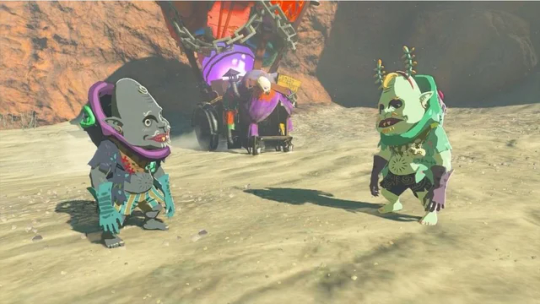
(these two guys are just. doing So Much and being So Valid despite being massive weirdos the game wants us to be slightly repelled by. I, for one, respect the Monster kinning grind and their general Twilight Princess energy.)
So. These two guys. There is so much to say about these two guys. I don't think I have seen the Trans Perspective on Kolton on tumblr, and I would love to get it because. I feel like it's a worthwhile discussion (just, how gender and identity is handled in TotK overall, I feel like it's a very complicated conversation and I have not seen super deep dives and I'd be very interested in hearing more).
Beyond the throughline of voluntary consumption of magical objects to turn into less human creatures being a weirdly prevalent plot point in TotK (Zelda, Kolton and Ganondorf casually transing their entire species for funsies --Ganondorf being particularly relentless with Fake Zelda, mummy/phantom shenanigans, Demon King and then literal dragon), I want to focus on Kilton a little bit.
Kilton is genuinely the only NPC in the game willing to acknowledge the inherent personhood that monsters have (the game does showcase them picking up fruits, mourning their boss if you kill them, being cutesy and happy to identify you as one of their own if you wear the appropriate mask --and that's not even getting into creatures like the Lynels, who seem to really edge on the limit of being a conscious creature with a system of honor and property and many other things). He does encourage us to think of monsters as more than a species whose only worth lie in how fun it is to eradicate them; even more, gameplay-wise, he does give us a reason to interact with them in other ways than just our sword with his museum. He does encourage us to see that beauty for ourselves and then select what we think is coolest/most intimidating/cutest/eight billion ganondorfs in every pose imaginable
The fact that Ganondorf is considered a monster was a great win for this feature in particular, and is very funny, but it's also... A lot, if we dig at it a little more than warranted. Beyond all of the Implications and all of the things of representation and political conflict and values already discussed ad nauseum: when did he stop being considered a human? What does that mean about the flimsiness of what is a monster and what is a creature and what is an animal and what is a person and what is even a hylian, as sheikahs got absorbed into the definition in this game? Especially with the stones taken into account, how profound changes in nature are a huge part of the plot (even when reversed and ultimately pretty meaningless): how easy it is, to make that slip? Who decides when that slip has been made? What is acceptable to hurt without remorse? What is beautiful and worth preserving? What is both at once? What is neither?
And again, in a classic Zelda conundrum (appreciative(?)): who the fuck gets to decide that, when, and why?
The Bargainers and the Horned God
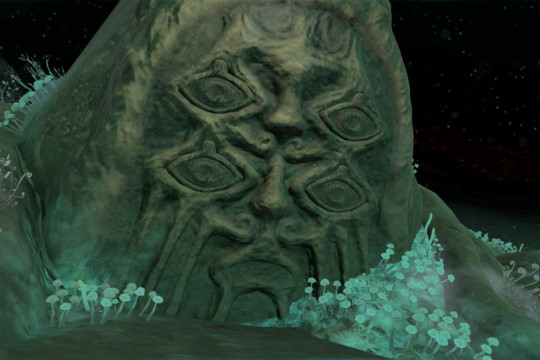
(major shoutout to these big guys for being the sole and only providers of actual depth to the Depths, and for looking cool as heck)
So. Let's move the conversation to the Depths.
Conceptually: what an interesting idea!! And so well executed (initially)!! A mirror world to the surface, dark and hushed and full of unknown creatures; haunted by gloom and sickness and the unknown. Not a first in the series, far from it: from ALTTP to ALBW, and even taking the Twilight world of TP into account, this idea of a Dark World acting as a deforming mirror to Hyrule and revealing many interesting aspects as we get to explore both is always a very interesting take on corruption and envy and fear/weakness and/or some sense of darkness looming under the perfect exterior. I'd argue even the Lens of Truth of both OoT and MM's serve a similar function, both gameplay-wise, but also in terms of theme: not everything is as it seems. In the world of Light, darkness must hide itself; but darkness also possess its own beauty, its own hardships, and will stare back at you without blinking if you go seek for it. It's, in my opinion, one of the series' most compelling conversation about the cyclical nature of fate, the coldness of godhood, and how small one feels in the face of a universe that is more complicated than it initially appears --which is why Courage must be invoked to push forward regardless.
The Depth's otherworldly ambiance is truy wonderful, whether in the plays of light and shadows, the creatures native to the environment we meet there (wish we met more!), the soundtrack, the strange aquatic/primordial plants, the fact that the dragons visit this place and connect them to the outside --invoking ideas of balance and interconnectivity, that the tree branches look like veins. The coliseums, the mines, the zonai facilities and the prisons do seem to poke at many things about what the relationship to the past was to this place; was it ever truly a place? Did it look like this back then? Why was it buried? Why did it come back? But in spite of it all, I think the Depths struggle overall to question or reveal anything about the surface that we couldn't already assume going in (that the only thing congealing there is Ganondorf's gloom, his lonely domain of Wrongness, only shared by Kohga and the yiga --the only naysayers of Goodness and Light, contemptful and blinded by self-importance and rage). The zonite is mined by gloomy monsters --why, what for?-- so any notion of greed and over-expansion that could have been associated to the zonai is now reabsorbed into Ganondorf's general evilness, since it needs to be reminded he is everything and anything bad with the world: darkness and conquest and greed and capitalism and pollution and bad weather and sickness and darkness and violence and war and death and betrayal and fakeness and lies and patriarchy and exploitation. No matter that he never does a single thing with zonite in the game; rather set up elements of conflict that never go anywhere than, for a second, let the foundations of absolute goodness and absolute evil risk becoming shaky --and you coming to this unwelcoming dark place that hates you, killing the miners and taking their resources for yourself is, on the other holy, royal fur-covered hand, utterly legitimate. The resources were once Rauru's after all, were they not?
And this is what I would say, except... except for the dead. The fallen warriors, the poes, and, most important of all: the Bargainer statues.
The Bargainers are, in-universe, godly creatures guiding the fallen to a place of final respite, regardless of moral alignment. The poes are all, fundamentally, cleansed of judgement: they are lost souls whose past reality does not matter anymore, and all deserve that peace regardless. In spite of the heavy paradise/hell parallels drawn in that game, with Rauru/Zelda/Sonia as the guardians of Light where Ganondorf gets to become a Devil-like figure, it is confirmed here that no such thing exists when you actually die in this universe.
It almost feels as if the fabric of Hyrule itself, in a brief moment that refuses to elaborate on its own point, goes: "yeah, whatever is happening here between Light and Darkness, it doesn't actually matter. This conflict is futile and doesn't understand the real nature of being alive, dead, a god, a person, a monster, an animal. The truth lies elsewhere --but you will never be told what it is."
It's: wild.
One of the game's most striking traits of narrative brilliance in my opinion --to the point where I'm wondering whether it's there on purpose or was effectively an oversight since every other aspect of reality breaks its own back trying to reassure us that everything is at its correct place, receiving the appropriate treatment by the universe in a way that is never to be questioned.
Another case of that ambiguity being allowed to exist without being immediately crushed and repressed is the case of the Horned God (interesting parallel to Ganon's actual horns that he develops in this game in case the hellish parallels weren't clear enough already): a demon Hylia sealed into stone and pushed far from humans in a clear case of questionable behavior since, while the Horned God isn't exactly nice, does propose a different philosophy you are not punished for exploring; and yet, a proposal that has seen itself persecuted in a very real sense by the goddess of absolute goodness, patron of hylians, Zelda, and many more. Pushed away from view.
Interesting.
And Yet, Light Must Prevail
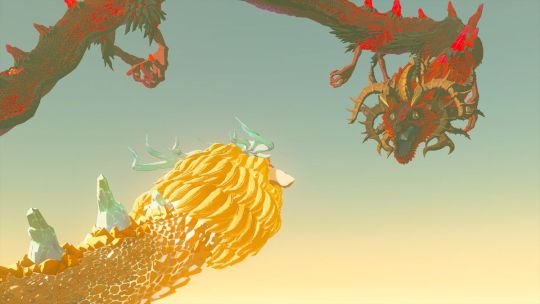
Okay, so, after all of this, we're left to ask... What the fuck is up with morality in Tears of the Kingdom?!
What do we trust? These half-breaths in the occasional sidequests that Light and Darkness is just the wrong frame of reference, that nature cannot be this simple, is ever-shifting and can be recalled or reaffirmed by arbitrary forces, and might even not matter at all in the universe's fabric, despite having so much of its lore soaking in the dychotomy? Or... everything else about the game, this insistence that Good must not only be assumed as whatever tradition the kingdom has passed down for thousands upon thousands of years, but remain utterly unquestioned the entire time? That Bad is without cause, graceless and unworthy of investment?
Are the Bargainer's statues the only thing worth listening to, that morality is a fable the living tells themselves --or should we be moved when Darkness destroys Light, when Light suffers to preserve itself and the world --but not when the Other is rightfully slain?
Was Kilton correct to see beauty in the monstrous? Was Kolton onto something when he let go of his previous form because there is no clear distinction between what should receive an arrow to the face and what shouldn't? Or should we rather focus on Zelda losing her human form as a beautiful and tragic sacrifice --but something that never actually altered her nature as a hylian, the descendant of a lineage of Good Kings meant to rule forever?
Is the Dondon good because it always was, or was it worth Zelda's love in spite of the fear it initially provoked?
Either way, at the end of the game, evil is slain. Ganondorf is, not killed, but --like his angry BotW boar counterpart-- destroyed, as monsters tend to be. He explodes over the lands of Hyrule, freed from Darkness; freed from everything wrong, since the foreign menace that embodied it all was wiped out in one fateful sweep of a holy blade cradled in sacrificial love. Nothing wrong remains. The Sages reaffirm their vows to protect the kingdom forward, and a very human --hylian-- Zelda smiles: Hyrule now forever and ever basked in eternal Light.
#totk#thoughts#tloz#totk critical#when will my brain return from the imprisoning war...#ganondorf#zelda#rauru#bargainer statue#kilton#kolton#dondon#this one gets a bit conceptual but#morality in totk is SUCH a headscratcher#I think this ambiguity is genuinely the only thing that keeps my brain interested in the subject#I am of the opinion that there was a big rewrite at some point#that severely simplified the conflict#and that morality was initially more a topic in TotK because.... the traces do seem to remain#it could also 100% be a case of developers not caring about themes at all whatsoever#and not realizing what they are saying or putting into question#but#worth pondering upon
354 notes
·
View notes
Text
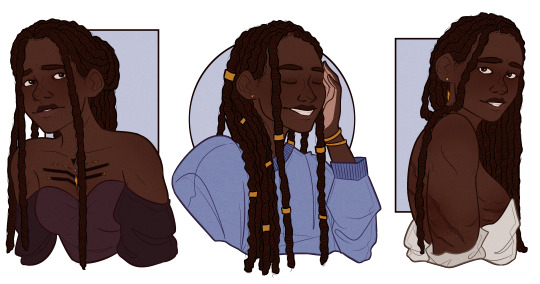
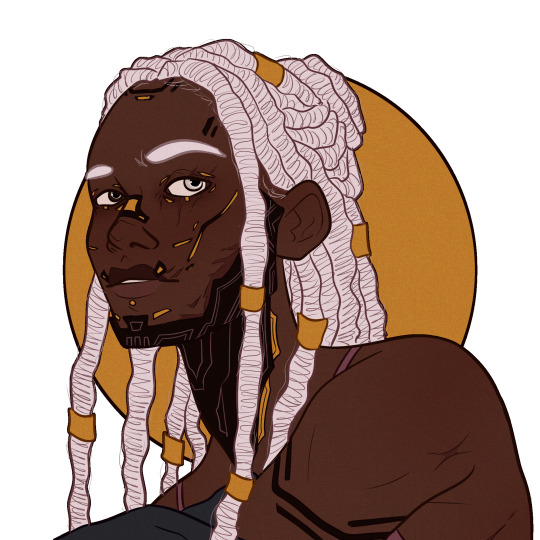
hanan at age 24 vs hanan at age 35 :] becoming a test subject at arasaka special programs really changes people huh
taglist (opt in/out): @shellibisshe, @florbelles, @ncytiri, @hibernationsuit, @stars-of-the-heart, @vvanessaives, @katsigian, @radioactiveshitstorm, @estevnys, @adelaidedrubman, @celticwoman, @rindemption, @carlosoliveiraa, @noirapocalypto, @dickytwister, @killerspinal, @euryalex, @ri-a-rose, @velocitic, @thedeadthree
#cp2077#cyberpunk 2077#art#art:hanan#nuclearocs#nuclearart#in the linked screenshots she's 32 :] that's when she's still at arasaka and forced to hunt down cassidy and seb#in the art she's no longer with them and has recovered from the horrors. and she's doing much better now :]#the linked article is basically some custom lore about arasaka special programs which is a branch red reaperkiller and i came up with#yeah i'm working on a wiki. don't worry about it. a lot of links aren't clickable yet sorry about that but feel free to take a look!#anyway all noteable test subjects of the projects have come out with a decent amount of cyberware so hanan is not alone in that#and losing hair pigment is also possible as a result of the test trials since it's happened with two test subjects so far#cyberjaws seem to be a recurring theme as well but that's just to inflict damage on andrew colton it's his personal cycle of hell. torment#anyway i will stop rambling now hello hi. give hanan a kiss she loves kissing
87 notes
·
View notes
Text
so like obviously we the audience couldn't have known about the ghosts' deaths before the show introduced them to us, largely via alison as an audience surrogate. but the way they're presented so often means that they are mysteries to the ghosts themselves. some of them are pretty unmistakable and obviously the ghosts that were there when it happened know, but even then. it seems like they just don't talk about it.
for example, when fanny opens up about being pushed by george and thomas says "I did know that, I was there" but like. you never brought it up before? in the couple hundred years of knowing her, you never mentioned it. and in the thomas thorne affair, which is all about the ghosts having different perspectives on thomas' death, the information each of them reveal is like. new to the other ghosts. which implies that they've never really talked about it together before.
which is fascinating because it could read either as like. being respectful of their privacy. which is sweet. or you can believe the sadder version which is that they just didn't talk to each other. hundreds of years together and they never asked. they never said "do you want to talk about it?" they never offered comfort on a death day. never shared the details of their own deaths. this read is corroborated pretty solidly by the bone plot and pineapple day.
and then there's also the aspect of the order the deaths are revealed making perfect sense with each of the ghosts' personalities and openness as people.
pat is an open book, trusting and genuine, and his cause of death is unmistakable. and his death day flashback is the earliest in the series. humphrey's cause of death is obvious but the circumstances are not, but when asked he's willing to share. and then most of the ghosts stop listening when they think he's a hero. hesitant to initiate conversation because it was so drilled into him by sophie's disinterest, and forgotten as soon as he's not important. thomas believes in the most romantic version of his own story, editorializing and glamorizing his betrayal to alison and being devastated when the truth is pieced together, mirroring his constant attempt to make things more idealized than they are, and his rare and poignant moments of sincerity. kitty's naivety and optimism made her truly believe she just fell asleep, never bothering to question the details of her death, and the ghosts knew just enough about eleanor's bullying to suspect her, but would never confront kitty about it directly. her episode comes late in the series and has a lot of intrigue and staging for a very mundane truth. and the captain!!! the last death reveal of the show, holding on to his attempted deception and secrecy until the very end, trying to bolster his image as a leader to the other ghosts and only succeeding in looking silly, being made to perform a role he isn't very good at for the chance of acceptance. and oh, look at that, that's exactly how he died.
anyway, this post got away from me but like. the utter craft that went into this show astounds me it's all so perfect. are you hearing this.
#everyone watch bbc ghosts right now#maybe this should be two different posts#but i just love when the logistics of the show match the subject matter#THEMES! PARALLELS! IMAGERY! SYMBOLISM!#yknow!!!#bbc ghosts#ghost5#ghosts s5#ghosts spoilers
194 notes
·
View notes
Text
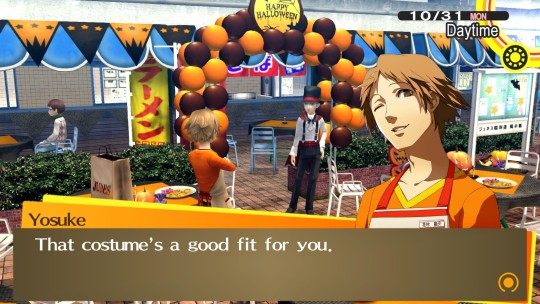
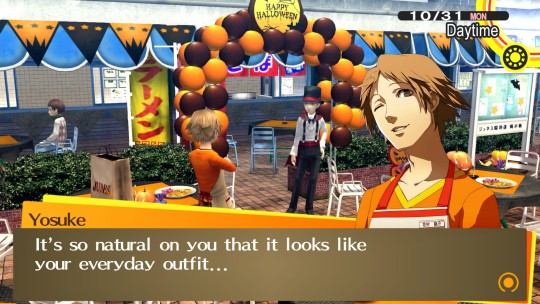
#persona 4#p4#persona 4 golden#p4g#hanamura yosuke#yosuke hanamura#narukami yu#yu narukami#souyo#YOSUKE WINKING AT YOUR AIBOU WHILE TELLING HIM HOW GOOD HE LOOKS ISNT EXACTLY HETEROSEXUAL EITHER#honestly after everything i think it would be an even bigger surprise if yu didnt think yosuke was flirting with him all the time#actually lets dig even deeper into this - yu is dressed as a Generic Vamprie#but what is the epitome of vampire icons but dracula himself?#and heres whats interesting - Dracula and the his author Graham Stoker have been the subject of queer discussion#but especially discussions around repressed homosexuality and internalised homophobia#in part due to Stoker's friendship and association with Oscar Wilde#but the theme of dracula as an “other” in society that also embodies a kind of hyperphysical domination#anyway thats something that has been discussed at length by others so i won't go into it#im also sure it was entirely a coincidence that yu is dressed as a vampire#its just so serendipitous now#he's good with his queue
258 notes
·
View notes
Text
I also find it funny that fandom will only accept Lyanna being her non-conforming, wild self in the context of saying that Arya isn't meant to be pretty; Any other day we get back-to-back posts about how Lyanna is actually super traditionally feminine cause she sniffled at a song once, so she's actually more like Sansa. Instead of constantly speaking on Arya and Lyanna, how about you guys reflect on why your standards of beauty for women are attached to how well they perform feminity within the patriarchy?
#lyanna stark#arya stark#asoiaf#/Lyanna isn't actually pretty she was a wild tomboy/ Those two things are not mutually exclusive 😭#how you look is not a reflection of your personality and this is also a running theme within the story#we have morally good characters who are ugly and morally bad characters who are beautiful this is like...kindergarten level#Lyanna is idealized in terms of her personality hence /you saw her beauty but not the iron underneath/#and Ned correcting Robert when he said Lyanna wouldn't have shamed him like Cersei had#he's a very shallow misogynistic character and I truly doubt he would've been as attached to the idea of her without surface level beauty#reminds me of people saying that Olivia Hussey is a bad fancast for them because she has a /doll like/ beauty and they're /rougher/ 😭#as though their entire facial structure magically changed once they realized they enjoyed playing with swords instead of sewing sdksdkdsksd#it's giving that one tiktok with the /cat pretty vs doe pretty vs bunny pretty/#even if you wanted to make the case that her beauty is idealized in her death we get Arya described a pretty multiple times?#idk it's just so wild to me to use personality as an indication of looks it just sounds so stupid#Arya/Lyanna can still have /delicate/ features (which is extremely subjective) and still have a wild personality#how about we acknowledge that the perception of both of them is warped by strict patriarchal gender norms instead?#some real analysis just to shake things up idk
62 notes
·
View notes
Text

[ID: The Toy Story "I don't want to play with you anymore" meme where Andy is throwing the Woody doll on the ground, with Woody labelled to read, "Subject I've been literally obsessed with for years," and Andy labelled, "Me getting a new hyperfixation over the course of a day." End ID]
#meme#hyperfixation#adhd#help me help me#staring at all my stuff pertaining to the old subject with slight disdain and regret for reasons beyond me#was losing my mind over it a few days ago and now can't be assed at all#my whole room defor has just recently been replaced with that subject theme and now im like hmm i dont want these but i do#but i dont because i want new subject!! but i dont want to impulse buy for new subject because i know my brain is a bitch girl help#relatable
101 notes
·
View notes
Text
A Hawks x Artist!Reader fic where you're out drawing random civilians and hoping for a chance to sketch some patrolling heroes too when you spot Hawks.
He's taking a quick break, perched leisurely on the roof of a nearby shop, surveying the area when he sees you drawing him. He freezes, wings that were previously softly waving coming to a still, golden eyes locking firmly onto yours.
You avert your gaze so fast your neck hurts, and you unsuccessfully try to hide behind your little sketchbook, your face on fire at getting caught. When you've caught your breath and you feel brave enough to look back, Hawks is holding up two fingers. Then he strikes a dramatic hero pose and you gape, eyes wide with disbelief as you realize he'll hold the pose for two minutes, just so you can draw him.
You do so with your heartbeat hammering in your ears.
#you don't see him often#but when you do he'll strike a different pose for you to draw#you start to draw a ton of pigeons to learn wing anatomy#your sketchbook that was supposed to have a variety of subjects eventually just features pigeons and Hawks#its a theme alright#Can i have time to just write silly fics and make silly art plz#Hawks as your personal model for learning anatomy tho???#a girl can dream#hawks#my writing#hawks x reader
171 notes
·
View notes
Text
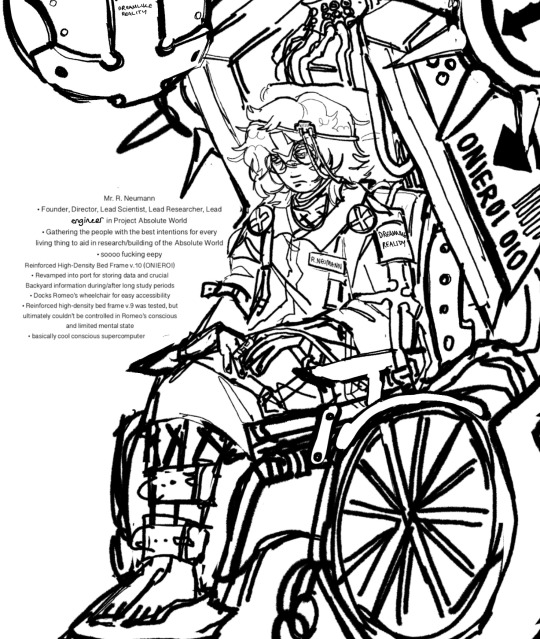


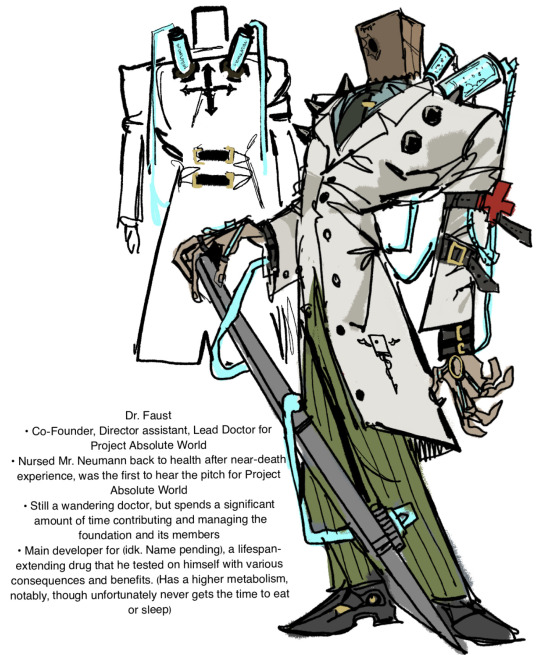


HEAVY work in progress stuff for.. a dumb lil au…….
#idk. we’re not cooking yet this is just meal prep#all of these designs and information is subject to change#im still adding characters#if there’s anyone that fits the general theme of peace at the cost of yourself that I’ve missed then lemme know🫡🫡#slayer could also be a significant backer for the project but i dont see him getting involved with the science and testing stuff#guilty gear#project absolute world#would#the abbreviated term for this au be#pawGG#awful.#robart#bedman guilty gear#bedman#faust guilty gear#raven guilty gear#robdesigns#CONSIOUS ISNT THE RIGHT WORD WHEN DESCRIBIG ONEIROI BTW. it just sorts itself i dont think any consious thing could hold That Much Info#yea fausts fit is inspired from his concept art . i lioev it somuch
387 notes
·
View notes
Text
Aight I’m gonna rant about the ending of totk… again. I deleted the first post cuz honestly my opinion has changed on it and I just wanna say some things cuz a lot of people left some awesome inputs.
Now I wanna say this first, I have nothing against happy endings. I love happy endings. Zelda games all have happy endings. But they’re also very bittersweet and some of them just outright devastating. This game def has a happy ending, but it’s underwhelming to me. What I want out of totk is CONSEQUENCE. You’re telling me that Link lost his arm and Zelda turned into a dragon and then in the end everything is back to normal and things are fine and dandy? Like it’s not a terrible thing, but it feels like everything you went through was kind of pointless cuz the characters don’t seem to have been affected by it. I would’ve been less upset if Zelda at least kept her memories as a dragon, or had some dragon features or something. The light dragon was easily the best part of the game and it ended in such an unsatisfying way. YOU don’t have to agree with that statement, but it was unsatisfying to me. I didn’t like how Rauru and Sonia’s bs magic just turned her back. I can understand Rauru’s arm being there since Link was there and Sonia’s time power turning her back to her original form, but how is she just there? It’s not a TERRIBLE solution but it’s not good to me personally.
A lot of people commented on the original post that there should’ve been a quest for Link to find a way to bring Zelda back, and I found that far more intriguing than leaving her as a dragon. This game is full of fetch quests but this type of quest I would’ve loved, besides, Impa WAS going to look for a way to bring Zelda back, it’s not like it would’ve come out of nowhere. I’m sure doing this would ruin the flow of the ending, but let’s think about AOC. Terrako dies. He stays dead at the ending. But after you finish the game, you can start rebuilding him, and there’s a second ending where Terrako is back with a cute second staff credit. Totk already has some AOC influence with the character bios and stuff, so I feel like it would’ve been fine if they had done this honestly. And it would’ve been more satisfying that the player WORKED towards Zelda returning back to normal. You can have the dive that parallels the beginning and all that stuff, it’s fine. I just feel like this would’ve been a better ending to the game.
But again, I want consequence. I want Zelda to either be haunted or amazed at seeing history before her very eyes as a dragon, I want Link’s arm to not magically regenerate, I want there to be something different with the characters. Cuz to me, it felt like the characters came out the same way they went in.
Now just to clarify, this would’ve fixed the ending for ME. If you’re content with the ending I do not care. Good for you. I’m so glad you’re happy. But this overhyped game wasn’t good for me and I have so many issues with it so I just wished that Nintendo did something better with the ending. Something more bittersweet or hopeful towards a future cuz there’s none of that (I guess Mineru dies but she was already dead and only Zelda cared about that so I really didn’t care that she officially died. And it’s not like she was an interesting character to begin with).
Tldr; I wish there were more consequence to the game and I wish the light dragon had a more satisfying ending
#this is the last time I’m posting about totk lol#I didn’t bring up the theme of sacrifice cuz so many people flipped out over that#saying that sacrifice wasn’t the main theme and I’m like#there doesn’t need to be only one theme bro#and everyone said that the theme was different things so clearly it’s subjective lol#anyways that’s that#I know I’m still gonna get annoying people misinterpreting what I said but#I have to remind myself that it’s just a game at the end of the day#good gameplay#good moments#terrible story and terrible lore#it completely ruined the lore of zelda#like Nintendo you canonized the timeline COMMIT to it#argh#smiles rambles#totk#totk spoilers#tears of the kingdom spoilers#tears of the kingdom#again. you may not agree with me#but frankly I do not care#totk salt
96 notes
·
View notes